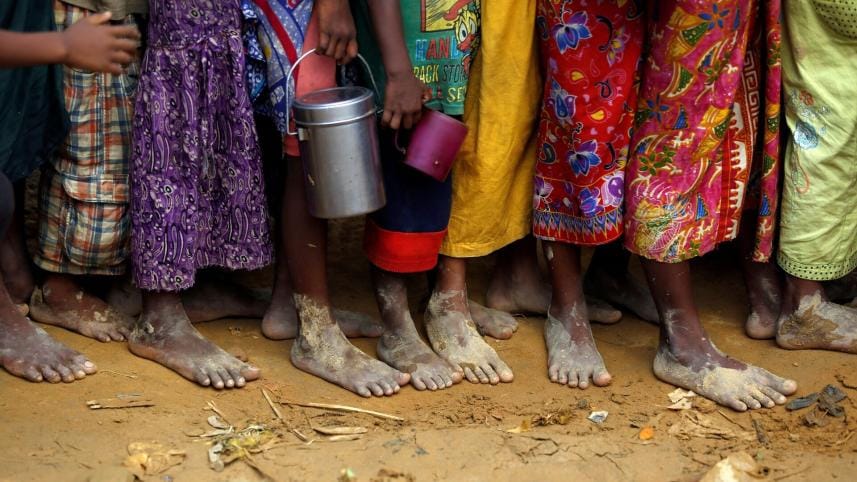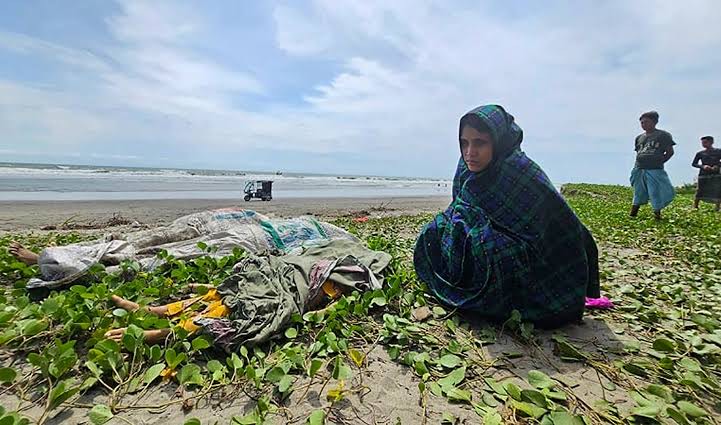Forced juvenile crimes in Rohingya camps is a security threat

The United Nations Convention on the Rights of the Child (UNCRC), adopted in 1989, defined the child as "Any human being under the age of eighteen unless the age of majority is attained earlier under national legislation. Nations that have ratified this convention or have acceded to it are bound by international law." This definition is applicable not just to citizens of a country but also to refugees.
In August 2017, over 773,000 Rohingya, including 400,000 children, crossed the border and arrived in Cox's Bazar district. Still, 600,000 Rohingya are living in the Rakhine state of Myanmar. As of March 31, 2024, there are 978,003 stateless Rohingya living in 203,204 families across 33 crowded makeshift camps in Ukhiya and Teknaf upazilas. A total of 107,736 boys and 103,516 girls between 5-11 years, and 70,812 boys and 66,217 girls from age 12-17 years live in the camps.
Young boys in the camp are targeted by adult criminal groups and forced to do and continue crimes. They are forced to get involved in intra-gang conflicts, gunfights, murders, theft, snatching of food rations, robbery, toll-collection from shops, online gambling, arsons in camps, attacks, sexual harassment, human trafficking, prostitution, smuggling, peddling, use of drugs and many other types of criminal activities. The camps are very unsafe at night, especially for girls and women. Victims' family members usually do not disclose or report the incidents of rape and gang rape due to fear of social stigma. Forced marriage is another form of torture. If a boy belonging to a criminal group takes an interest in a girl, he and his gang force her family members to arrange the marriage. However, boys also face sexual harassment by gang members.
Children in Rohingya camps grow up in small and crowded shelters with a lack of necessary facilities with only minimal food, inadequate access to water and sanitation, limited mental health support, inadequate opportunities for education, and insufficient open space for recreational activities. Frustration and helplessness of young boys are being exploited by various armed groups, such as the Arakan Rohingya Salvation Army (ARSA), the Rohingya Solidarity Organization (RSO), and the Munna Gang. These groups are accused of abducting people for ransom, forced marriage, and recruiting children for armed practices. Young boys and girls also fall for tempting promises like better jobs in the capital, migration to Malaysia, or even a smart phone. Gradually, crimes increase in the camps and the surrounding host community.
These events are not independent of the Rohingya refugee crisis. It is a socio-political challenge for Bangladesh. The host community is against the local integration of Rohingya refugees. They argue that Bangladesh is a small country with slow economic progress. Moreover, the Rohingya people will pose threats to security and peace in South Asia and Asian regions, they add.
Therefore, the preventive efforts for juvenile crimes in Rohingya refugee camps need to be comprehensive at the policy and practice levels. Integrated strategies and engagement by key stakeholders—like UN bodies, global political leaders, international development agencies, the government of Bangladesh, NGOs, the private sector, and civil society—are urgently required for the wellbeing of Rohingya children and to reduce security threats in Bangladesh and other countries.
Since Bangladesh is a signatory to the UNCRC and other relevant legal instruments, international bindings should be addressed in laws relating to child rights. Besides, the jurisdiction of the special tribunal (formed under the Special Powers Act) should not extend to children in conflict with the law. To ensure this, an amendment of the law is recommended. Also, the office of the Refugee Relief and Repatriation Commission (RRRC) should take initiatives for the dissemination of existing policies and awareness building in refugee camps with the extensive support of NGOs. Law enforcement agencies and the Camp-in-Charge (CiC) office should jointly identify juvenile gangs with the support of Majhi (headman), religious leaders, and youth groups, with assistance from the UNHCR to access their database. Law enforcement agencies must also increase vigilance to stop the recruitment of young boys into criminal gangs.
Additionally, international development agencies should increase programmes to provide psychosocial support, education, life skill development, vocational training, sports, and recreational activities through effective community engagement. There should be discussions about juvenile crimes and their demerits with the participation of community members. Parenting sessions and block-based sharing meetings must be arranged. Regional forums, such as SAARC, ASEAN, and the ASEAN Economic Committee, can be leveraged to solve the Rohingya refugee crisis and ensure their safe repatriation to Myanmar. Besides, diplomatic relations should be enhanced between Bangladesh, China, and India to exert pressure on Myanmar for the repatriation of Rohingya with dignity and to find a sustainable solution.
Dr Mohammed Mamun Rashid is development professional and adjunct faculty member of a renowned private university in Bangladesh. He can be reached at rashidmamuns@yahoo.com.
Views expressed in this article are the author's own.
Follow The Daily Star Opinion on Facebook for the latest opinions, commentaries, and analyses by experts and professionals. To contribute your article or letter to The Daily Star Opinion, see our guidelines for submission.



 For all latest news, follow The Daily Star's Google News channel.
For all latest news, follow The Daily Star's Google News channel. 
Comments